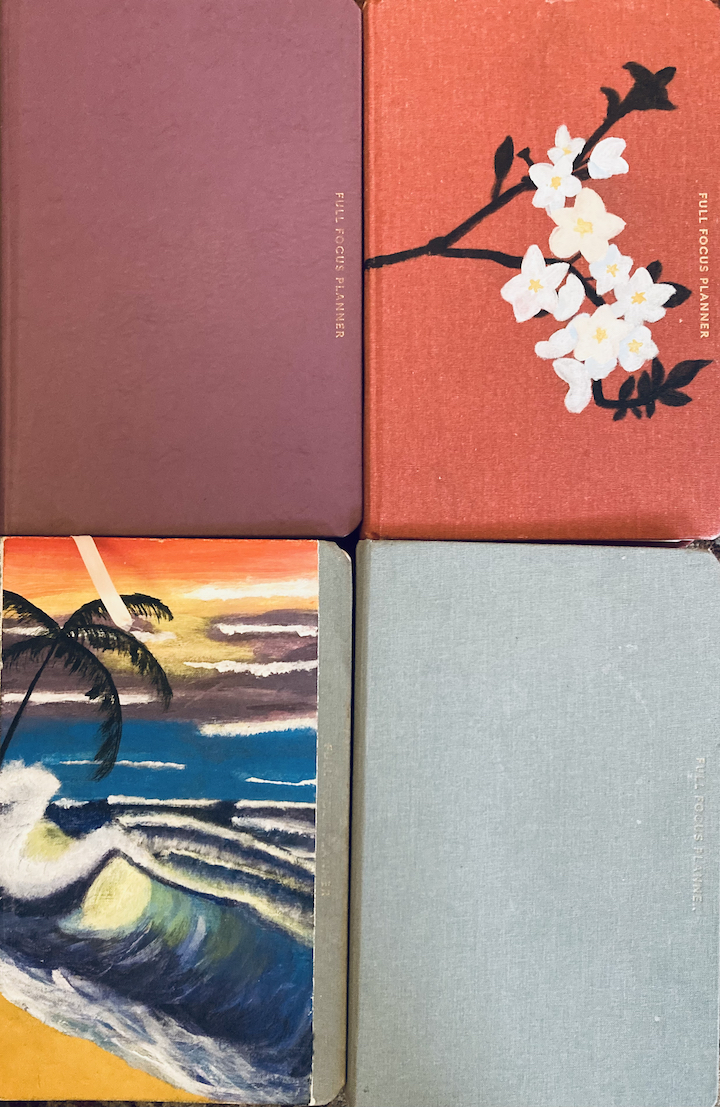📒 Review: Full Focus Planner: How to Stay Positive, Organized, and Focused
 |
| My 2022 Full Focus Planners I painted Quarters 2 and 3. |
⭐️ ⭐️ ⭐️ ⭐️ ⭐️
What symptoms did the Full Focus Planner address for me?
- 1,000 tasks in my brain at a time
- No idea where to start
- Long-term projects being pushed to the last minute
- Feelings of discouragement for "not doing anything today"
- Little tasks getting lost in the shuffle
How did it address the symptoms?
- Key Projects section - List your most important tasks for the upcoming quarter. Other Tasks and Notes spaces on Daily pages. Weekly Overview space where I keep rolling over tasks.
- Ranking my most important goals and projects. Using the Goal Detail pages to break down the goal into action steps. Sending these action steps to Weekly Big 3 and Daily Big 3 pages.
- Using calendar pages and quarter pages to set regular deadlines for the action steps.
- Feelings of encouragement from checking off my Big 3 each day and saying I accomplished important things today.
- Checklist-style entries with a key with symbols to code if the task is finished, waiting for something, deferred, delegated, or deleted. Tasks that are not completed or deleted get sent to the following day.
How did I learn about the Full Focus Planner?
Last year, my husband became interested in Full Focus through a podcast. One product they make, their Full Focus Planner, really caught his interest. I was very skeptical of this system because of the expense and also because I had experience trying planner systems that were far too cumbersome to set up or set up but with not enough space. I abandoned those systems and found that I was making long lists on loose-leaf paper and leaving them around the house. I would hang on to this list of never-ending tasks and feel bad daily for not accomplishing anything.
After using this method for a few quarters, my husband was keeping work at work and coming home when he planned and being present. He was more organized and positive.
My husband wanted me to try this method too, but I was reluctant. Like the Bullet Journal method, this planner required a lot of front-end setup. It was also a very expensive system because you need 4 planners for one year.
In contrast to the Bullet Journal, however, I didn't need to create my planner from scratch, which eventually became a chore. In contrast to a yearly planner, Full Focus had equal space for each day of the week rather than shrinking Saturday and Sunday.
I was very skeptical that this would help, but I was getting annoyed by the recurring reminders on my phone (to the point of ignoring them!) and my loose-leaf paper wasn't organized or motivating.
At the beginning of 2022, my husband bought the Best Year Ever course from Full Focus and encouraged me to watch with him. Almost immediately I was sold on this method as I realized they were using a researched-based approach to help people reach their goals. I was already learning how to implement challenging limiting beliefs and all-or-nothing thinking using Cognitive Behavioral Therapy techniques and this planner is built specifically to implement those challenges.
How is the Full Focus Planner structured?
The Full Focus Planner is a quarterly planner that is centered around goal setting. To start small, the Start Here page gives a Simple Setup: On the first Day page, list your top 3 tasks for the day. This is called your Daily Big 3. Check them off as you accomplish them. Just 3 tasks. There is a list for other tasks below the Big 3, but the Big 3 are the tasks that have priority for accomplishing your goals and to help you feel like you did something today.Did I have my Best Year Ever?
What annual goals did you specifically accomplish?
- Have a fully licensed business by
August 21???Whenever Chicago can figure it out - Status: Completed, but much later than August 21st.
- Teach my 5-year-old how to read daily and finish lesson book by April 30
- Status: Completed by May 7
- Post 1 composition a month on Soundcloud, Pond5, and/or Arrange Me
- Status: Completed on time
- Finish reading Daring Greatly by Brené Brown by March 31
- Status: Completed on time
- Read the Bible 4 times a week (48 times) by September 30
- Status: Completed
- Composition Competition by April 30
- Status: Completed. "The Voyage Home"
- Composition Competition Entry by July 31
- Status: Completed "Save the Sheep!"
- Spend quality time with my daughters everyday by December 31
- Status: Completed, however I didn't track this.
- Symphonina Competition Entry by December 15
- Status: Completed
What planned goals were not accomplished?
- Memorize Romance movement from Chopins' Concerto in E Minor (8 ½ pages) by June 5
- Status: Abandoned
- Do physical therapy or yoga every morning (80 times)
- Status: Abandoned despite the reward of cheesecake...
- Practice piano every morning for 30 minutes at 6am (60 times) by March 31
- Status: Partially completed (I have a ~ in the checkmark box)
- Plant lawn and garden by May 31st
- Status: I have an indoor tomato plant I grew from a seed. Hoping for a better season in 2023.
- Composition Competition Entry by October 31
- Status: Abandoned in favor of the Symphonina Competition





